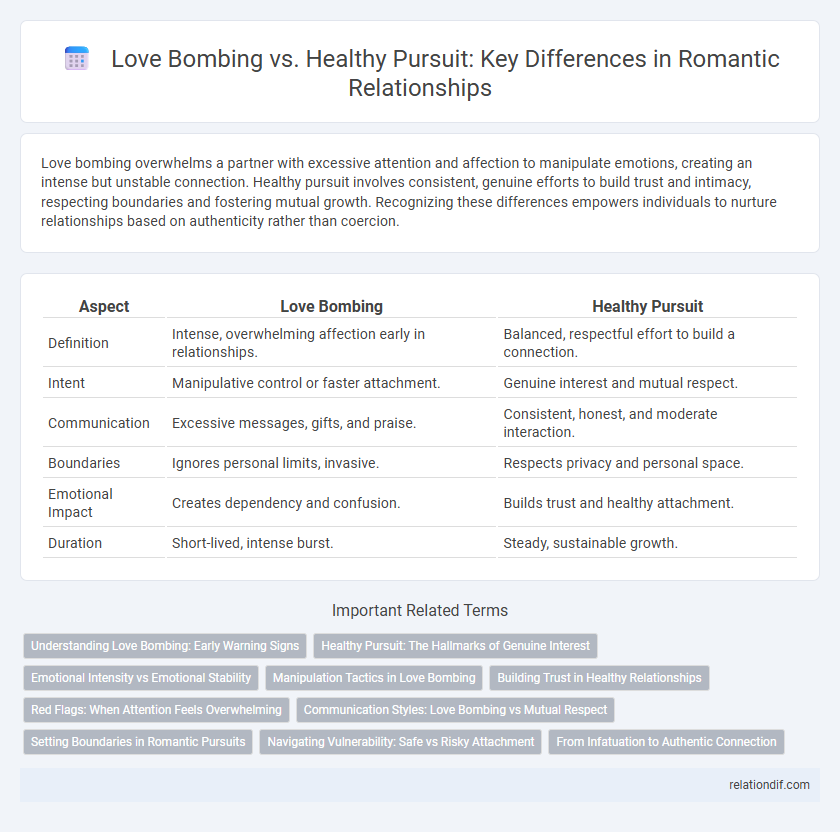Love bombing overwhelms a partner with excessive attention and affection to manipulate emotions, creating an intense but unstable connection. Healthy pursuit involves consistent, genuine efforts to build trust and intimacy, respecting boundaries and fostering mutual growth. Recognizing these differences empowers individuals to nurture relationships based on authenticity rather than coercion.
Table of Comparison
| Aspect | Love Bombing | Healthy Pursuit |
|---|---|---|
| Definition | Intense, overwhelming affection early in relationships. | Balanced, respectful effort to build a connection. |
| Intent | Manipulative control or faster attachment. | Genuine interest and mutual respect. |
| Communication | Excessive messages, gifts, and praise. | Consistent, honest, and moderate interaction. |
| Boundaries | Ignores personal limits, invasive. | Respects privacy and personal space. |
| Emotional Impact | Creates dependency and confusion. | Builds trust and healthy attachment. |
| Duration | Short-lived, intense burst. | Steady, sustainable growth. |
Understanding Love Bombing: Early Warning Signs
Love bombing is characterized by overwhelming displays of affection and attention designed to manipulate and control a partner, often emerging quickly and intensely in the early stages of a relationship. Recognizing early warning signs such as excessive compliments, constant texting, and pressure for rapid commitment helps distinguish it from a healthy pursuit, which progresses at a comfortable and respectful pace. Awareness of these behaviors protects emotional well-being by preventing dependence on insincere or coercive affection.
Healthy Pursuit: The Hallmarks of Genuine Interest
Healthy pursuit in romance manifests through consistent communication, respectful boundaries, and genuine emotional availability, reflecting sincere interest. Partners engage in meaningful conversations and show empathy, prioritizing mutual growth rather than overwhelming intensity. This balanced approach fosters trust and a deeper connection, distinguishing it from manipulative love bombing tactics.
Emotional Intensity vs Emotional Stability
Love bombing involves overwhelming emotional intensity through excessive attention and affection to quickly captivate a partner, often masking underlying control motives. In contrast, healthy pursuit emphasizes emotional stability by building trust gradually, allowing feelings to develop naturally without pressure or manipulation. Emotional stability fosters long-term connection and mutual respect, whereas love bombing risks emotional exhaustion and codependency.
Manipulation Tactics in Love Bombing
Love bombing involves intense, overwhelming displays of affection designed to manipulate and control the recipient, often leading to emotional dependency. Unlike healthy pursuit, which respects boundaries and fosters mutual trust, love bombing uses flattery, excessive gifts, and constant attention as tactics to gain power. Recognizing these manipulation strategies is crucial for maintaining emotional well-being and establishing balanced romantic relationships.
Building Trust in Healthy Relationships
Love bombing involves overwhelming someone with excessive affection and attention to manipulate their emotions, often undermining genuine trust. In contrast, healthy pursuit fosters trust through consistent, respectful communication and gradual emotional connection. Building trust in healthy relationships requires patience, transparency, and mutual understanding, which establishes a stable foundation for lasting intimacy.
Red Flags: When Attention Feels Overwhelming
Love bombing often manifests as an intense and excessive display of affection early in a relationship, which can signal manipulation rather than genuine care. In contrast, healthy pursuit involves consistent, respectful attention that allows emotional boundaries and individual space to flourish. Recognizing red flags such as overwhelming messages, rapid declarations of love, and pressure to escalate intimacy prevents emotional harm and supports balanced romantic connections.
Communication Styles: Love Bombing vs Mutual Respect
Love bombing involves overwhelming someone with excessive affection and constant communication to manipulate emotions, often disregarding the other person's boundaries. Healthy pursuit emphasizes balanced communication, where both partners express feelings openly while respecting each other's need for space and autonomy. Mutual respect in communication fosters trust and emotional safety, contrasting with the controlling and insistent messages typical of love bombing.
Setting Boundaries in Romantic Pursuits
Establishing clear boundaries in romantic pursuits is essential to distinguish between love bombing and a healthy relationship. Love bombing often involves overwhelming attention and affection that can blur personal limits, leading to emotional manipulation. Prioritizing mutual respect and consistent communication helps maintain balanced connections and ensures that both partners feel safe and valued.
Navigating Vulnerability: Safe vs Risky Attachment
Love bombing often masks insecure attachment by overwhelming a partner with excessive affection and attention, creating a risky emotional environment prone to manipulation. Healthy pursuit, by contrast, fosters secure attachment through consistent, respectful communication and gradual emotional intimacy, allowing vulnerability to be safely navigated. Recognizing these patterns empowers individuals to differentiate supportive love from potentially harmful dynamics, safeguarding emotional well-being.
From Infatuation to Authentic Connection
Love bombing often starts with overwhelming attention and grandiose gestures that create intense but superficial infatuation, masking true intentions. Healthy pursuit emphasizes gradual emotional intimacy, mutual respect, and consistent actions that build trust and genuine connection over time. Shifting from infatuation to authentic connection requires recognizing emotional manipulation and prioritizing open communication and shared values.
Love Bombing vs Healthy Pursuit Infographic

 relationdif.com
relationdif.com